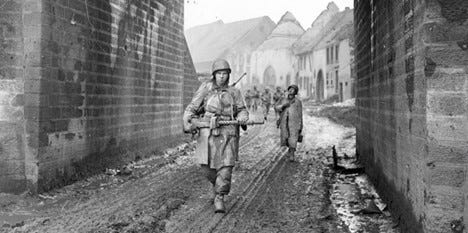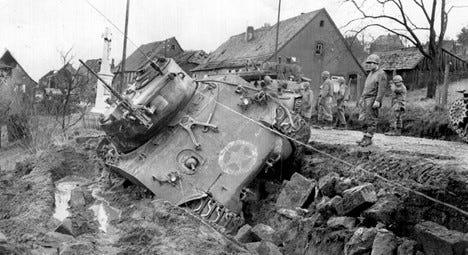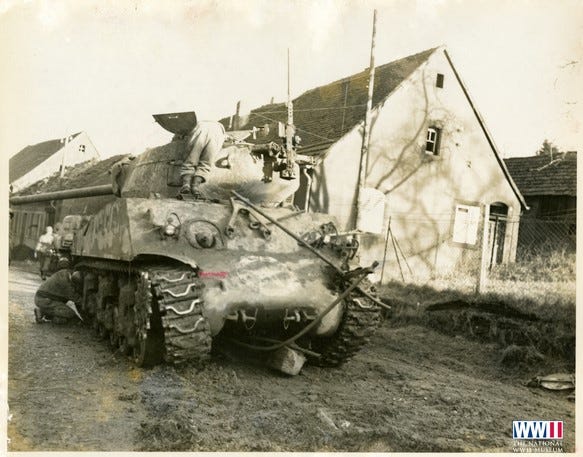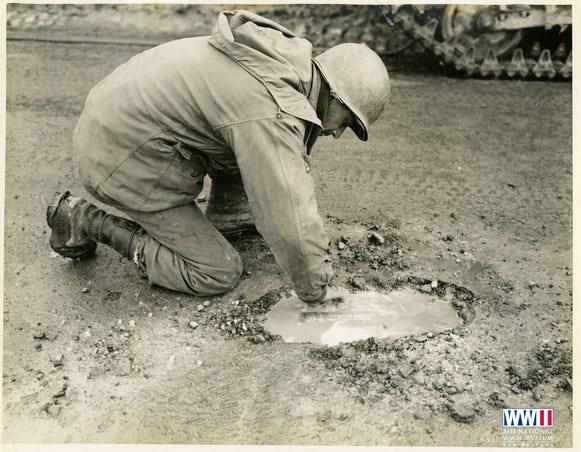The rest at Goetzenbruck didn’t last long. On December 8, Dad's platoon trained infantry how to use the kinds of things needed to blow through concrete pillboxes as they headed toward the Maginot Line--shaped charges, satchel charges, and Bangalore torpedoes. They also had to free a tankdozer, which had broken down in a muddy ditch.
Soon the regimental combat team moved in on Lemberg, a crossroads town with a railroad track and roads leading east toward the Alsatian plain and north toward Bitche at the center of a Maginot Line complex. Military intelligence thought there were few Germans in Lemberg. The officers in charge of the regiment were gung ho. However, military intelligence was wrong. Not only was it a valuable crossroads, it was easy to defend. It was surrounded by deep railroad cuts, steep hills, and thick forest. There were concrete pillboxes guarding the road, 88s dug in on the hills, and, a new and horrible twist, anti-aircraft guns set horizontally with ammunition that exploded on impact, spraying flak into the men.1 It was a trap.
As the morning reports note on December 8, Lt. Bell and T.C. blew a roadblock of trees and mines in front of a tank attack while under fire. T.C. of course made the event seem anything but heroic. The way he told it, they had gone out with a squad to blow up the roadblock--the squad in the truck and Bell and T.C. in the jeep--but when a sergeant was wounded and with the in-coming shells coming fast and furious, Bell pulled the squad back. When they pulled back, Lt. Col. Zehner—the commander of the Red Raiders of the first battalion—was impatiently waiting to order the infantry to charge. He told Lt. Bell, (in the words of T.C., the self-described Georgia boy) “no, you got to go blow them trees.” So Bell and T.C. went back on their own. Bell wasn’t going to risk the whole squad. As T.C. said, “We blew those damn trees. Bell and myself.” T.C. thought it was funny that it was the one time that Bell wanted to get out of a situation before he did: “We got the in-coming 88s right away. Next I knowed, he’s out in the hill, turned that jeep around, and was ready to go before I was even near.” Though T.C. didn’t make it sound heroic, this is the action that earned T.C. his Bronze Star.
Sometimes, it felt as though the upper echelon officers at the rear were the enemy. The infantrymen were ordered to cross open ground in daylight. The men thought that was suicide and it was. The casualties were horrific. The Germans were dug in and ready for them. The war always looks different when it’s told as arrows on a map.
Dad’s morning report on December 8 simply says that they were “assisting the 2nd Battalion.” It doesn’t mention what the 2nd Battalion was doing. They were fighting across open ground under heavy fire to get to the other edge of town, making little progress. The day after was no better. The living retreated under the storm of shells, and the wounded lay all night in the icy rain.2 Those who dug in for a time and then tried to get back to the lines found their legs had gone numb. One man recalled “half crawling and stumbling" to get back to where his unit was trying to reorganize through the dead bodies.3 Companies were reduced the size of squads.
The next day, two battalions of the 399th continued fighting on the west side of town, while the second battalion swung around to charge through the railroad underpass into town, where the Germans were waiting. As one of the riflemen recalled it, it was
like a reenactment of World War I. We had not gone more than five yards, when the Germans opened up with their rapid fire machine guns, rifles, and mortar shells. They even fired their 20 mm anti-aircraft guns at us with tracers and exploding shells. There was booming noise and smoke and streaking bullets whizzing all around us. I had the strangest feeling that I was not really there in the middle of all this mayhem. In my mind, I was floating as I was running straight for the cover of the railroad embankment and I did not feel any terror or exhaustion. It was not me, but someone else who was there, and I was just an observer. I didn’t even seem to hear or smell the battle. It was like a dream.4

Company A of the 781st Tank Battalion, fresh from the States, joined the 399th at Lemberg and tipped the balance. Once the infantry entered the town, they fought house to house. The tanks “belched fire into houses” then men kicked in the front door.5 They had to clear the houses, including the basements. One man recalled the cold chill he felt when he realized there were people in the dark. He lit a match and realized civilians huddled in the corner.6
On the 2004 Battlefield tour, we heard from one of those civilians. One of the men on the tour, a retired career officer himself, had been exploring in Lemberg and met a man he brought to meet the rest of us. The man was quite shy and didn’t speak English, so the woman who ran the hotel translated as she could. He had been 15 when the Americans arrived. His mother and siblings and he were hiding in their cellar from the destruction raging above them when the Americans came down into the dark of the cellar. He recalled that they were wearing grenades (there were clips on the GI ammo belt for grenades and clips on the combat jacket lapels for grenades so they could wear quite a few) and they were brandishing guns. They moved the guns and a flashlight as they searched each face for danger. The suspense ended when his mother held up what little they had—schnapps and apples—and offered it.
One rifleman pinned down by a sniper in a house, called in a tank to take care of it. The tank sent a shell into the house and blew it up. As he recalled, it “eliminated the sniper but did not improve the house”7
By December 11, the 399th held the town, but, as the historian of the Seventh Army, Keith Bonn, says, “the casualties in some of the 399th line companies were staggering.”8 It was an intense and bloody battle, a small forgotten moment in the big war.
Holding a town didn't mean it was a safe town. An infantry platoon leader named Tyson was ordered on December 11 to head up a burial detail, but it was snowing hard, about 10 inches overnight, so it was hard work to find the bodies. They loaded them on a jeep, but in driving behind the lines, the jeep hit a glass mine, undetectable under the snow. “I remember that in training we were told that there would be a pop like a firecracker…I heard the pop, my position in the Jeep gave me a clear area to my right and I tried with all my weight to push away from the jeep….I received only some shrapnel and suffered a broken foot. But the windshield was blown back and finished off everyone else in the jeep.9
The French man who had been a boy in the cellar recalled that for six years with the Germans, they got nothing. The Americans arrived, and they got corned beef in a can. At a reception for the 2004 battlefield tour in Lemberg, a gentleman who spoke just a little English—far more than my French—told my sister and me that he had been 11 years old when the soldiers came to Lemberg. They entered the house. When they found out it was his birthday, they went away. As he told us four times in a row, they quickly returned with an astonishing and incomprehensible combination of “11 bubblegums, 11 chocolat, 11 spanks.”
But as noted, war doesn’t do much to improve a town. As the man from the cellar told us, after the fighting, 75% of the houses in Lemberg were damaged. They had no material to fix their roofs and it was winter, so they used the spent artillery shell casings. They hammered the brass thin and nailed them as shingles to the roofs to fill in the holes. The people hoped that the fighting had passed and would never return.
The 399th stepped back to recoup and repair.


Dad's platoon on December 11, cleared mines on the road out of Lemberg to Mouterhouse.

On December 12, they cleaned their equipment. On December 13, they built two 18-foot span bridges to replace the ones the Germans had blown, and Dad found time to write another letter home. I don't know exactly where he was staying. The 399th did move back toward Goetzenbruck so it was probably south of Lemberg.
Dec 13th ‘44
Somewhere in France 2000 hrs
Dearest
War is Hell. Coffee on the kitchen stove perking, radio playing dance music from B.B.C., and just had my nightly bath in the tub. You should see my bed, a European inner spring, a twin bed combination. The war did knock the city water supply out and ruined the electricity so that the appliances won’t work. The rent is about due tomorrow and we haven’t the money to pay so will be on the move. It is a pleasure to come home to something like this cozy little apartment. Had to repair the roof today. A breeze went by. Remind me to tell you about the merits of French windows some time, really nice.
Here is another teaser for your travelogue—visited Sarrebourg and Saverne about 2 weeks ago. Not allowed to tell present location. I had a very pleasant tour through the Vosges Mountains awhile back.
Have had a struggle getting anti-freeze for my Mercedes. Got a nice hot air heater attached now. Took a trip over to see Willie in A Co. We haven’t seen one another for a month. Companies stay split up. He liked my bus. Wants a picture of it. Seems Denton [another lieutenant in the 325th engineers] isn’t standing up too good. Received a very nice Xmas package from St. Stephens church in Elsmere. Damn funny a man can’t get a package from his lawfully wedded wife. How about breaking down, Cherub.
Have seen a few deer I would like to shoot at.
All for now
Love
Gordon





